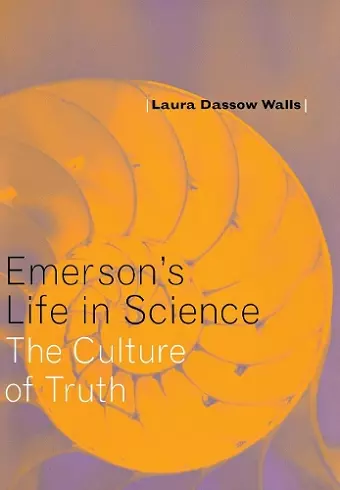Emerson's Life in Science
The Culture of Truth
Format:Hardback
Publisher:Cornell University Press
Published:28th Feb '03
Currently unavailable, and unfortunately no date known when it will be back

Ralph Waldo Emerson has traditionally been cast as a dreamer and a mystic, concerned with the ideals of transcendentalism rather than the realities of contemporary science and technology. In Laura Dassow Walls's view Emerson was a leader of the secular avant-garde in his day. He helped to establish science as the popular norm of truth in America and to modernize American popular thought. In addition, he became a hero to a post-Darwinian generation of Victorian Dissenters, exemplifying the strong connection between transcendentalism and later nineteenth-century science.In his early years as a minister, Emerson read widely in natural philosophy (or physics), chemistry, geology, botany, and comparative anatomy. When he left the church, it was to seek the truths written in the book of nature rather than in books of scripture. While visiting the Paris Museum of Natural History during his first European tour, Emerson experienced a revelation so intense that he declared, "I will be a naturalist." Once he was back in the United States, his first step in realizing this ambition was to deliver a series of lectures on natural science. These lectures formed the basis for his first publication, Nature (1836), and his writings ever after reflected his intense and continuing interest in science.Walls finds that Emerson matured just as the concept of "the two cultures" emerged, when the disciplines of literature and science were divorcing each other even as he called repeatedly for their marriage. Consequently, Walls writes, half of Emerson's thought has been invisible to us: science was central to Emerson, to his language, to the basic organization of his career. In Emerson's Life in Science, she makes the case that no study of literary history can be complete without embracing science as part of literature. Conversely, she maintains, no history of science is complete unless we consider the role played by writers of literature who helped to install science in the popular imagination.
'The revelation of Thought takes man out of servitude into freedom.... The day of days, the great day of the feast of life, is that in which the inward eye opens to the Unity in things, to the omnipresence of law.' Emerson's Life in Science shows us how Emerson developed this faith.
* The New England Quarterly *Emerson's Life in Science is the best: Of the spate of books on Emerson that have marked the bicentennial of his birth, this is one that will endure.... The author's command of her subject comes through unmistakably. No specialist in nineteenth-century American literature surpasses Walls in knowledge of the history of science.... Anyone wishing to know more about what science meant to Emerson should start here.
-- Lawrence Buell, Harvard University * American Scientist *In Emerson's Life in Science: The Culture of Truth, Laura Dassow Walls gives a full account of Ralph Waldo Emerson's engagement with the discourses and philosophy of natural and social science. The range of Emerson's interests was very broad, extending from astronomy, physics, geology, and botany to anthropology, sociology, and statistics. In characterizing these interests, Walls maintains a judicious balance between the judgmental and the appreciative. On the one hand, she freely grants Emerson's old-fashioned propensity for enlisting science as reinforcement of a vision of cosmos and history rendered coherent by moral law; on the other hand, she also does fuller justice than any precursor has to Emerson's more avant-garde insistence that what counts as truth must be obedient to science—and to Emerson's canniness at his best as a critical interpreter of scientific claims.... Through Emerson's Life in Science, Walls encourages scholars to look more closely at Emerson's place in modern science. In trying to better define the relationship between Emerson and science—and perhaps between science, culture, and literature—Walls questions the overall place of science in Emerson's life.
* Biology Digest *Rather than a life narrative, she delivers a brilliantly associative intellectual biography, organized around central habits of nineteenth-century scientific thought: patterns of gnomic growth, polarity, evolution.
-- Lance Newman, California State University, San Marcos * American Literature *The evolution of ideas on the grand scale is a fascinating problem, and Walls' exploration of Emerson, the dominant American prophet of science and technology, opens up this world for a delightful and revealing read.
* New ScientiISBN: 9780801440441
Dimensions: 235mm x 155mm x 24mm
Weight: 907g
296 pages